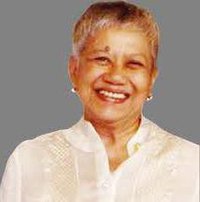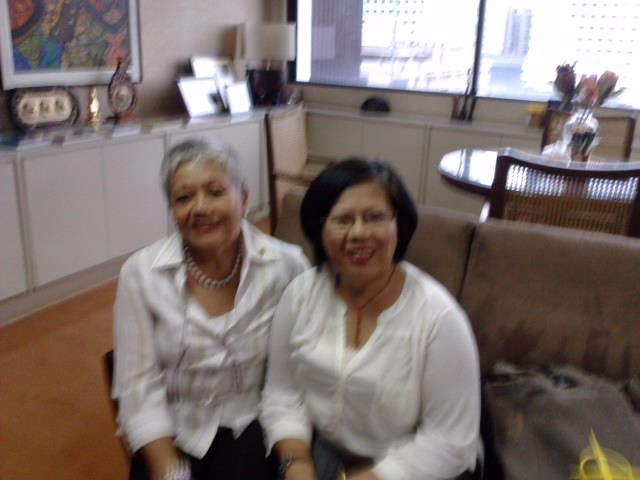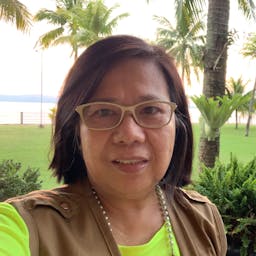Ging, the Pinay Peace Maker
Jan 21, 2015
Story


"One day at a time"
This is what Secretary Teresita Quintos Deles, the Presidential Adviser on the Peace Process said when asked how she copes with the myriad of responbilities in the government's efforts to end all armed conflicts in the Philippines. Yes indeed, the person on top of the formal track of peace negotiations that have been traditionally dominated by men anywhere in the world, is a gracious peace activist in her 60s, a recognized NGO leader and a happily married woman.
Much has been written about her efforts in the peace and feminist movement. Her work experience spans more than three decades of purposeful , creative, pioneering and a tenacious commitment to social transformation. She is better known by her nickname Ging and conspicuous in her trademark short, straight platinum hair which has inspired many women to stop dying their hair to let their crown turn silver and gray naturally.
Her convictions for peace, good governance and gender equality is as honest as her undyed hair. She didn't accept the unequal world as it is and decided to take steps to explore alternative family lifestyles for development workers. Ging started to ‘walk the talk’ in the early 70s when the Philippines was under dictatorial rule and helping the poor was a risky endeavor. Her family wasn't spared of Marcos' atrocities when her husband, Jojo Deles(,)who was helping urban residents undertake a livelihood project was arrested and detained during Martial Law. Her pregnancy spared her from the arrests and they learned to continue their political work covertly on top of their day jobs.
In the early days of her development work, she took steps to support young professionals who opted to explore alternative careers and lifestyles in social development outside of the corporate sector. Concerned with women NGO workers who would unquestioningly follow their husbands decision for their wives to work outside the home or not, Ging had to bring the ‘women’ question home to their own lives. The NGO meetings, which became avenues for women development workers to informally huddle and talk about their own gender issues at home, gave birth to the national feminist organization, PILIPINA. Ging chaired PILIPINA and was a major coalition builder and convener of women NGOs, namely: Philippine Women’s Research Collective (PWRC), Lakas ng Kababaihan, Legislative Advocates for Women (LAW), and the Women Action Network for Development (WAND).
In international conferences and talks, Ging urged women from the different parts of the world to fight for shared work and family responsibilities in their own homes with their husbands, fathers, brothers and sons. She stressed that women’s perspectives must be included in every government policy. Ging also asked for a serious review on the impact of aid and economic policies on women and children. She was a founding member of the Asian Women’s Research and Action Network(AWRAN)which prepared the alternative Asian and Pacific reports presented in Nairobi, Kenya in 1985. She served as an Expert-Member of the UN-CEDAW from 1991-1994 and a Committee Rapporteur for two years.
“When two or three are doing something, the possibilities are there”
Ging Quintos-Deles has brought together stakeholders from the basic sector, church hierarchy, politicians, military officials, communist leaders and Muslim rebels in dialogues and to the negotiation table to find a positive common ground and multi-sectoral solutions to the interlinked issues of poverty, gender oppression and armed conflict.
“God doesn’t give you something that you can’t do”.
Equipped with innate feminine wisdom, clear vision, grace, fortitude and experience in working with the poor, Ging expanded her constituency when she moved from civil society to government as the Lead Convener of the National Anti-Poverty Commission (NAPC) and the Office of the Presidential Assistant on the Peace Process(OPAPP). Both agencies are responsible for rallying government resources towards poverty reduction and peace.
When Ging was appointed Secretary of the National Anti-Poverty Commission, she made sure that all the 14 basic sectors ( women, children, youth, farmers, elderly, persons with disabilities, farmers, fishers, labor and migrant workers, informal sector, cooperatives and NGOs) from different political affiliations were properly consulted . She likewise ensured that the leaders could influence national development and social reform agenda by having regular and direct access to the highest official in government including the President. She enjoyed the trust and confidence of both government and civil society and while deep into anti-poverty work, she was appointed to head the Joint Enforcement and Monitoring Committee (JEMC) and as a member of the government’s negotiating panel with breakaway groups of the communist party.
Ging’s work at the NAPC and OPAPP brought her to the most depressed urban poor sites, remote and hard to reach villages and conflict-affected communities in the country. She fostered dialogues between and among government, civil society, military and people of different religious and ideological backgrounds to understand where they were coming from, overcome prejudices and find common ground to inculcate the culture of peace.
“I don’t think we should stereotype in peace work".
She believes that both women and men should be on the peace table. Women play a big role in peace negotiations because they can break the ice and connect with each other by talking about their children and families. Besides, women’s voices should be heard in decisions to wage peace as they had to bear the dire consequences of war and the difficult healing process.
“I want my children to inherit a world that is better than ours”
Ging will always be a mother and the future of her children has always been a major motivation of her quest for a genuine, just and lasting peace in a democratic society. She was most thankful when the Marcos dictatorship ended in 1986 because her second daughter was only two years old at that time and was able to spend the better part of her childhood growing free from the terrors of an autocratic ruler. It’s no wonder why she is persistent in pursuing the peace process NOW and not later.
Meanwhile Ging is thankful for the gift of being able to enjoy work without knowing how it will end ,the grace of being recharged by power naps during her trips , for watching films on TV during restful weekends and for spending time with her husband and children.
She draws on inspiration from Tita Cory, the icon of democracy, at the end of the day when everything has been said and done, let go and let God do the rest.
Thanks to Ging Deles, the Pinay Peace Maker , for showing us that a genuine, just and lasting peace is not only a possibility but also a reality.
This article is part of a writing assignment for Voices of Our Future a program of World Pulse that provides rigorous
new media and citizen journalism training for grassroots women leaders. World Pulse
lifts and unites the voices of women from some of the most unheard regions of the
world.




